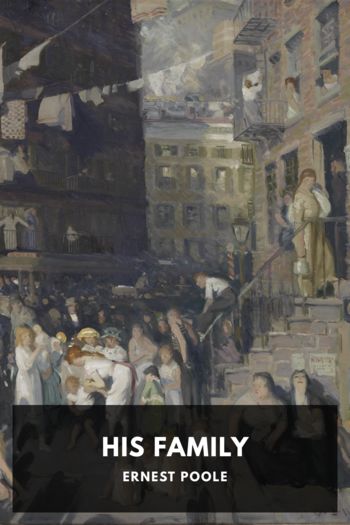His Family - Ernest Poole (ereader for comics .txt) 📗

- Author: Ernest Poole
Book online «His Family - Ernest Poole (ereader for comics .txt) 📗». Author Ernest Poole
A tired scowling woman said, “My boy won’t obey me. His father is dead. When I slap him he only jumps away. I lock him in and he steals the key, he keeps it in his pocket. He steals the money that I earn. He says I’m from the country.” And a flabby anxious woman said, “My girl runs out to dance halls. Sometimes she comes back at two in the morning. She is fifteen and she ought to get married. But what can I do? A nice steady man who never dances comes sometimes to see her—but she makes faces and calls him a fatty, she dances before him and pushes him out and slams the door. What can I do?”
“Please come and see our janitor and make him fix our kitchen sink!” an angry little woman cried. “When I try to wash the dishes the water spouts all over me!” And then a plump rosy mother said in a soft coaxing voice, “I have eight little children, all nice and clean. When you tell them to do anything they always do it quickly. They smile at you, they are like saints. So could the kind beautiful teacher fix it up with a newspaper to send them to the country—this summer when it is so hot? The newspaper could send a man and he could take our pictures.”
“Most of us girls used to be in this school,” said a bright looking Jewess of eighteen. “And you taught us how we should live nice. But how can we live nice when our shop is so rotten? Our boss is trying to kiss the girls, he is trying to hug them on the stairs. And what he pays us is a joke, and we must work till nine o’clock. So will you help us, teacher, and give us a room for our meetings here? We want to have a union.”
A truant officer brought in two ragged, frightened little chaps. Found on the street during school hours, they had to give an account of themselves. Sullenly one of them gave an address far up in the Bronx, ten miles away. They had not been home for a week, he said. Was he lying? What was to be done? Somewhere in the city their homes must be discovered. And the talk of the truant officer made Roger feel ramifications here which wound out through the police and the courts to reformatories, distant cells. He thought of that electric chair, and suddenly he felt oppressed by the heavy complexity of it all.
And this was part and parcel of his daughter’s daily work in school! Still dazed, disturbed but curious, he sat and watched and listened, while the bewildering demands of Deborah’s big family kept crowding in upon her. He went to a few of the classrooms and found that reading and writing, arithmetic and spelling were being taught in ways which he had never dreamed of. He found a kindergarten class, a carpenter shop and a printing shop, a sewing class and a cooking class in a large model kitchen. He watched the nurse in her hospital room, he went into the dental clinic where a squad of fifty urchins were having their teeth examined, and out upon a small side roof he found a score of small invalids in steamer chairs, all fast asleep. It was a strange astounding school! He heard Deborah speak of a mothers’ club and a neighborhood association; and he learned of other ventures here, the school doctor, the nurse and the visitor endlessly making experiments, delving into the neighborhood for ways to meet its problems. And by the way Deborah talked to them he felt she had gone before, that years ago by day and night she had been over the ground alone. And she’d done all this while she lived in his house!
Scattered memories out of the past, mere fragments she had told him, here flashed back into his mind: humorous little incidents of daily battles she had waged in rotten old tenement buildings with rags and filth and garbage, with vermin, darkness and disease. Mingled with these had been accounts of dances, weddings and christenings and of curious funeral rites. And struggling with such dim memories of Deborah in her twenties, called forth in his mind by the picture of the woman of thirty here, Roger grew still more confused. What was to be the end of it? She was still but a pioneer in a jungle, endlessly groping and trying new things.
“How many children are there in the public schools?” he asked.
“About eight hundred thousand,” Deborah said.
“Good Lord!” he groaned, and he felt within him a glow of indignation rise against these immigrant women for breeding so inconsiderately. With the mad city growing so fast, and the people of the tenements breeding, breeding, breeding, and packing the schools to bursting, what could any teacher be but a mere cog in a machine, ponderous, impersonal, blind, grinding out future New Yorkers?
He reached home limp and battered from the storm of new impressions





Comments (0)